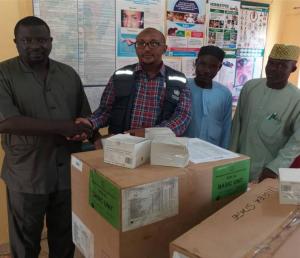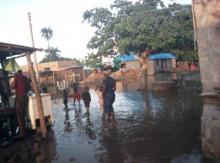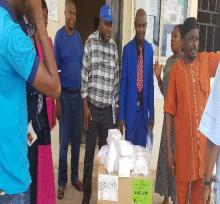WHO works with government agencies to respond to floods across Nigeria
Abuja, 3 October 2018 - World Health Organization (WHO) is closely working with the Federal Ministry of Health, Nigeria Centre for Disease Control (NCDC) and the National Emergency Management Agency (NEMA) in States affected by floods to support the health response to the emergency. Based on its technical expertise and its field presence in all affected states, WHO is assisting Federal and state authorities with the assessment of the health situation and needs.
Due to heavy rains across the country, Nigeria is experiencing large-scale flooding since August. As of 26 September 2018, 87 Local Government Areas (LGAs) in 12 States (Adamawa, Anambra, Bayelsa, Benue, Delta, Edo, Kebbi, Kogi, Kwara, Niger, Rivers and Taraba) experienced floods of varying magnitudes. According to NEMA, at least 17,816 houses were destroyed, and 826,403 individuals affected resulting in 199 fatalities and 176,299 persons internally displaced.
“In addition to the immediate destructions and loss of lives, floods can severely affect the health of the affected population, even after the water levels have receded,” said Dr Wondimagegnehu Alemu, WHO Country Representative in Nigeria said.
In close coordination with FMOH, NCDC and NEMA, WHO is supporting Nigeria’s response to the flooding and providing lifesaving health emergency services to the affected population. Floods and their consequences (e.g. lack of clean water, lack of shelter) can lead to increase risks of infection due to water-borne and vector-borne diseases such as cholera and malaria. In addition, access to healthcare and essential drugs can be difficult due to the loss of health infrastructures.
“We can efficiently mitigate these risks if they are properly assessed and if disaster response measures are in place. WHO is committed in supporting Nigeria’s efforts to reduce the impact of these floods on the health of the people in coordination with Federal and State authorities”, Dr Alemu added.
To prevent and control the spread of communicable diseases due to the flooding, WHO already deployed experts to strengthen surveillance and early warning response capacity in the newly created camps hosting displaced population. The Organization is also assisting government’s efforts to make essential drugs and commodities available to the affected population as well as providing logistical support to the Federal Ministry of Health to deploy medicines and equipment. Through field personnel, WHO is pre-positioning emergency health kits and strengthening capacity of the federal and state authorities to provide essential medicines, supplies as well as equipment to the affected population. In addition, field teams are participating in joint assessment missions with the Federal and State Ministries of Health while WHO State Coordinators and epidemiologists are mobilized to monitor the situation in other affected areas.
"The Federal Ministry of Health under the leadership of Prof. Isaac Adewole, is actively mobilized and engaged with other Federal and State authorities to effectively respond to the flood. We welcome WHO’s commitment and support to this response to the flooding and her efforts at mobilising other development partners. The Federal Ministry of Health and WHO are trusted partners and continue to work closely together in these coordinated efforts to protect and address the health needs of all Nigerians affected by the flooding." said Dr Ngozi Azodoh, Director of the Special Department at FMOH.
Through its partners, WHO aims at supporting the mobilization of additional resources to further scale up its support and the health intervention against the flood.
Kindly follow us on Social Media:





